| Listing 1 - 8 of 8 |
Sort by
|

ISBN: 377053882X Year: 2004 Publisher: Paderborn : W. Fink,
Abstract | Keywords | Export | Availability | Bookmark
 Loading...
Loading...Choose an application
- Reference Manager
- EndNote
- RefWorks (Direct export to RefWorks)
Economics in literature. --- Fiction --- History and criticism.
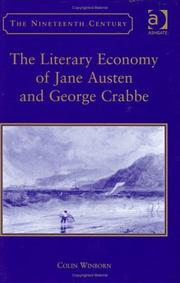
Abstract | Keywords | Export | Availability | Bookmark
 Loading...
Loading...Choose an application
- Reference Manager
- EndNote
- RefWorks (Direct export to RefWorks)
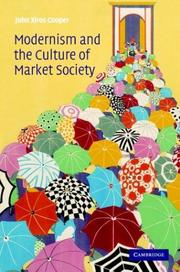
ISBN: 9780521834865 0521834864 9780511485374 9780521120111 0511227582 9780511227585 0511231679 9780511231674 0511229283 9780511229282 0511230125 9780511230127 0511230907 9780511230905 0511485379 1280703083 9781280703089 1107161134 9781107161139 0511316801 9780511316807 052112011X Year: 2004 Publisher: Cambridge Cambridge University Press
Abstract | Keywords | Export | Availability | Bookmark
 Loading...
Loading...Choose an application
- Reference Manager
- EndNote
- RefWorks (Direct export to RefWorks)
Many critics argue that the modernist avant-garde were always in opposition to the commercial values of market-driven society. For John Xiros Cooper, the avant-garde bears a more complex relation to capitalist culture than previously acknowledged. He argues that in their personal relationships, gender roles and sexual contacts, the modernist avant-garde epitomised the impact of capitalism on everyday life. Cooper shows how the new social, cultural and economic practices aimed to defend cultural values in a commercial age, but, in this task, modernism became the subject of a profound historical irony. Its own characterising techniques, styles and experiments, deployed to resist the new nihilism of the capitalist market, eventually became the preferred cultural style of the very market culture which the first modernists opposed. In this broad-ranging 2004 study John Xiros Cooper explores this provocative theme across a wide range of Modernist authors, including Joyce, Eliot, Stein and Barnes.
English literature --- Thematology --- anno 1900-1999 --- Modernism (Literature) --- Capitalism and literature --- American literature --- Avant-garde (Aesthetics) --- Consumption (Economics) in literature. --- Economics in literature. --- Aesthetics --- Modernism (Art) --- Literature and capitalism --- Literature --- History and criticism. --- History --- Arts and Humanities --- LITTERATURE ANGLAISE --- MODERNISME (LITTERATURE) --- CAPITALISME ET LITTERATURE --- LITTERATURE AMERICAINE --- AVANT-GARDE (ESTHETIQUE) --- CONSOMMATION (ECONOMIE POLITIQUE) DANS LA LITTERATURE --- ECONOMIE POLITIQUE DANS LA LITTERATURE --- 20E SIECLE --- HISTOIRE ET CRITIQUE --- GRANDE-BRETAGNE --- ETATS-UNIS
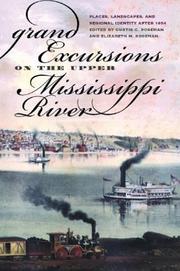
ISBN: 1587294850 9781587294853 0877458855 9780877458852 0877458847 9780877458845 1587295202 9781587295201 Year: 2004 Publisher: Iowa City University of Iowa Press
Abstract | Keywords | Export | Availability | Bookmark
 Loading...
Loading...Choose an application
- Reference Manager
- EndNote
- RefWorks (Direct export to RefWorks)
Intricate Relations charts the development of the novel in and beyond the early republic in relation to these two thematic and intricately connected centers: sexuality and economics. By reading fiction written by Americans between 1789 and 1814 alongside medical theory, political and economic tracts, and pedagogical literature of all kinds, Karen Weyler recreates and illuminates the larger, sometimes opaque, cultural context in which novels were written, published, and read.In 1799, the novelist Charles Brockden Brown used the evocative phrase "intricate relations" to
Regionalism --- Landscapes --- Human geography --- Nationalism --- Interregionalism --- Countryside --- Landscape --- Natural scenery --- Scenery --- Scenic landscapes --- Nature --- History. --- Mississippi River Valley --- Mississippi River --- Mississippi Valley --- History, Local. --- History --- Description and travel. --- American fiction --- Desire in literature --- Economics in literature --- Property in literature --- Sex in literature --- Sex --- Gender (Sex) --- Human beings --- Human sexuality --- Sex (Gender) --- Sexual behavior --- Sexual practices --- Sexuality --- Sexology --- History and criticism --- Economic aspects --- Economics in literature. --- Property in literature. --- Desire in literature. --- Sex in literature. --- History and criticism. --- Economic aspects.
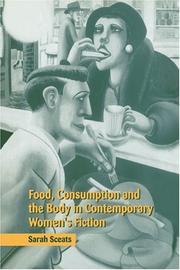
ISBN: 0521661536 1316274934 0511048734 1280162090 0511150865 0511485387 0511324758 0511118023 1107118158 0511017510 9780511017513 9780521661539 0511033494 9780511033490 9780511118029 9780511048739 9780511150869 9780511485381 9780521604550 0521604559 Year: 2004 Publisher: Cambridge Cambridge University Press
Abstract | Keywords | Export | Availability | Bookmark
 Loading...
Loading...Choose an application
- Reference Manager
- EndNote
- RefWorks (Direct export to RefWorks)
This study explores the subtle and complex significance of food and eating in contemporary women's fiction. Sarah Sceats reveals how preoccupations with food, its consumption and the body are central to the work of writers such as Doris Lessing, Angela Carter, Margaret Atwood, Michèle Roberts and Alice Thomas Ellis. Through close analysis of their fiction, Sceats examines the multiple metaphors associated with these themes, making powerful connections between food and love, motherhood, sexual desire, self identity and social behaviour. The activities surrounding food and its consumption (or non-consumption) embrace both the most intimate and the most thoroughly public aspects of our lives. The book draws on psychoanalytical, feminist and sociological theory to engage with a diverse range of issues, including chapters on cannibalism and eating disorders. This lively study demonstrates that feeding and eating are not simply fundamental to life but are inseparable from questions of gender, power and control.
Consumption (Economics) in literature. --- Eating disorders in literature. --- English fiction. --- English fiction - Women authors - History and crit. --- Food habits in literature. --- Food in literature. --- Human body in literature. --- Women and literature. --- English fiction --- Food in literature --- Women and literature --- Consumption (Economics) in literature --- Eating disorders in literature --- Human body in literature --- Food habits in literature --- Gastronomy in literature --- English --- Languages & Literatures --- English Literature --- History and criticism --- Women authors --- History --- Gastronomy in literature. --- History and criticism. --- Body, Human, in literature --- Human figure in literature --- Arts and Humanities --- Literature --- Nutritionary hygiene. Diet --- Fiction --- Thematology --- Carter, Angela --- Lessing, Doris --- Roberts, Michèle --- Ellis, Alice Thomas --- Atwood, Margaret --- ROMAN ANGLAIS --- FEMMES ET LITTERATURE --- CORPS HUMAIN DANS LA LITTERATURE --- NOURRITURE DANS LA LITTERATURE --- FEMMES ECRIVAINS --- HISTOIRE ET CRITIQUE --- 20E SIECLE --- ANGLETERRE --- Writers --- Food --- Book --- Auteurs. --- Boek. --- Literatuur. --- Thematologie. --- Verhalend proza. --- Voeding. --- Voedingshygiene Dieet. --- Atwood, Margaret. --- Carter, Angela. --- Ellis, Alice Thomas. --- Lessing, Doris. --- Roberts, Michele.

ISSN: 04352866; ISBN: 0729408493 9780729408493 Year: 2004 Volume: 2004:10 Publisher: Oxford : Voltaire Foundation,
Abstract | Keywords | Export | Availability | Bookmark
 Loading...
Loading...Choose an application
- Reference Manager
- EndNote
- RefWorks (Direct export to RefWorks)
Economics in literature --- Economie dans la littérature --- Economie in de literatuur --- Geld in de literatuur --- Money in literature --- Monnaie dans la litterature --- Economics and literature --- Artists and patrons --- Economie politique et littérature --- Artistes et mécènes --- History --- Histoire --- France --- Intellectual life --- Vie intellectuelle --- French literature --- History and criticism --- Economie politique et littérature --- Artistes et mécènes --- 17th century --- 18th century --- French literature - 17th century - History and criticism --- French literature - 18th century - History and criticism --- Economics and literature - France - History - 17th century --- Economics and literature - France - History - 18th century
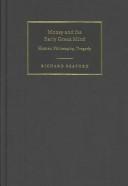
ISBN: 0521832284 0521539927 1107148774 0511185871 0511185049 0511313756 0511483082 1280449535 0511187718 0511186789 9780511186783 9780511187711 9780521539920 9780521832281 9780511185878 9780511185045 9780511483080 9781280449536 9786610449538 6610449538 9780511313752 9781107148772 Year: 2004 Publisher: Cambridge, UK New York Cambridge University Press
Abstract | Keywords | Export | Availability | Bookmark
 Loading...
Loading...Choose an application
- Reference Manager
- EndNote
- RefWorks (Direct export to RefWorks)
How were the Greeks of the sixth century BC able to invent philosophy and tragedy? In this book Richard Seaford argues that a large part of the answer can be found in another momentous development, the invention and rapid spread of coinage which produced the first ever thoroughly monetised society. By transforming social relations, monetisation contributed to the ideas of the universe as an impersonal system (presocratic philosophy) and of the individual alienated from his own kin and from the gods (in tragedy). Seaford argues that an important precondition for this monetisation was the Greek practice of animal sacrifice, as represented in Homeric Epic, which describes a premonetary world on the point of producing money. This book combines social history, economic anthropology, numismatics and the close reading of literary, inscriptional, and philosophical texts. Questioning the origins and shaping force of Greek philosophy, this is a major book with wide appeal.
Greek literature --- Money in literature. --- Greek drama (Tragedy) --- Epic poetry, Greek --- Economics and literature --- Economics in literature. --- Philosophy, Ancient. --- Money --- Littérature grecque --- Monnaie dans la littérature --- Tragédie grecque --- Poésie épique grecque --- Economie politique et littérature --- Economie politique dans la littérature --- Philosophie ancienne --- Monnaie --- History and criticism. --- Histoire et critique --- Homer --- Knowledge --- Economics. --- Greece --- Grèce --- Economic conditions --- Conditions économiques --- Littérature grecque --- Monnaie dans la littérature --- Tragédie grecque --- Poésie épique grecque --- Economie politique et littérature --- Economie politique dans la littérature --- Grèce --- Conditions économiques --- Arts and Humanities --- History --- Currency --- Monetary question --- Money, Primitive --- Specie --- Standard of value --- Exchange --- Finance --- Value --- Banks and banking --- Coinage --- Currency question --- Gold --- Silver --- Silver question --- Wealth --- Ancient philosophy --- Greek philosophy --- Philosophy, Greek --- Philosophy, Roman --- Roman philosophy --- Literature --- Literature and economics --- Economic aspects --- Hóiméar --- Hūmīrūs --- Homeros --- Gomer --- Omir --- Omer --- Omero --- Ho-ma --- Homa --- Homérosz --- האמער --- הומירוס --- הומר --- הומרוס --- هومر --- هوميروس --- 荷马 --- Ὅμηρος --- Гамэр --- Hamėr --- Омир --- Homère --- Homero --- 호메로스 --- Homerosŭ --- Homērs --- Homeras --- Хомер --- ホメーロス --- ホメロス --- Гомер --- Homeri --- Hema --- Pseudo-Homer --- Pseudo Omero --- Homerus --- GR / Greece - Griekenland - Grèce --- 331.151 --- 92 --- Geschiedenis. --- Histoire. --- History. --- 92 Geschiedenis. --- 92 Histoire. --- 92 History. --- Geldwezen in de oudheid --- Geschiedenis
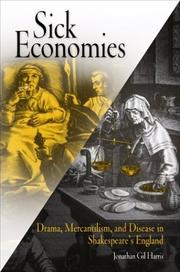
ISBN: 0812237730 1322510601 0812202198 Year: 2004 Publisher: Philadelphia : University of Pennsylvania Press,
Abstract | Keywords | Export | Availability | Bookmark
 Loading...
Loading...Choose an application
- Reference Manager
- EndNote
- RefWorks (Direct export to RefWorks)
From French Physiocrat theories of the blood-like circulation of wealth to Adam Smith's "invisible hand" of the market, the body has played a crucial role in Western perceptions of the economic. In Renaissance culture, however, the dominant bodily metaphors for national wealth and economy were derived from the relatively new language of infectious disease. Whereas traditional Galenic medicine had understood illness as a state of imbalance within the body, early modern writers increasingly reimagined disease as an invasive foreign agent. The rapid rise of global trade in the sixteenth century, and the resulting migrations of people, money, and commodities across national borders, contributed to this growing pathologization of the foreign; conversely, the new trade-inflected vocabularies of disease helped writers to represent the contours of national and global economies. Grounded in scrupulous analyses of cultural and economic history, Sick Economies: Drama, Mercantilism, and Disease in Shakespeare's England teases out the double helix of the pathological and the economic in two seemingly disparate spheres of early modern textual production: drama and mercantilist writing. Of particular interest to this study are the ways English playwrights, such as Shakespeare, Jonson, Heywood, Massinger, and Middleton, and mercantilists, such as Malynes, Milles, Misselden, and Mun, rooted their conceptions of national economy in the language of disease. Some of these diseases-syphilis, taint, canker, plague, hepatitis-have subsequently lost their economic connotations; others-most notably consumption-remain integral to the modern economic lexicon but have by and large shed their pathological senses. Breaking new ground by analyzing English mercantilism primarily as a discursive rather than an ideological or economic system, Sick Economies provides a compelling history of how, even in our own time, defenses of transnational economy have paradoxically pathologized the foreign. In the process, Jonathan Gil Harris argues that what we now regard as the discrete sphere of the economic cannot be disentangled from seemingly unrelated domains of Renaissance culture, especially medicine and the theater.
Diseases in literature. --- Economics in literature. --- English drama --- Literature and medicine --- Mercantile system --- History and criticism. --- History --- Cameralism --- Kameralism --- Mercantilism (Mercantile system) --- Balance of trade --- Economic policy --- Shakespeare, William, --- Shakespeare, William --- Shakespear, William, --- Shakspeare, William, --- Šekʻspiri, Uiliam, --- Saixpēr, Gouilliam, --- Shakspere, William, --- Shikisbīr, Wilyam, --- Szekspir, Wiliam, --- Šekspyras, --- Shekspir, Vilʹi︠a︡m, --- Šekspir, Viljem, --- Tsikinya-chaka, --- Sha-shih-pi-ya, --- Shashibiya, --- Sheḳspir, Ṿilyam, --- Shaḳspir, Ṿilyam, --- Syeiksŭpʻio, --- Shekspir, V. --- Szekspir, William, --- Shakespeare, Guglielmo, --- Shake-speare, William, --- Sha-ō, --- Şekspir, --- Shekspir, Uiliam, --- Shekspir, U. --- Šekspir, Vilijam, --- Ṣēkspiyar, Viliyam, --- Shakspir, --- Shekspyr, Vyli︠e︡m, --- Şekspir, Velyam, --- Ṣēkspiyar, Villiyam, --- Shēkʻspʻiyr, Vlilliam, --- Ṣēkspiyar, --- Ṣēkspiyar Mahākavi, --- Ṣēkspiyar Mahākaviya, --- Sheḳspier, Ṿilyam, --- Shēkʻspir, --- Shakespeare, --- Śeksper, --- Шекспир, Вильям, --- Шекспир, Уильям, --- שייקספיר, וויליאם, --- שייקספיר, וו., --- שיקספיר, וויליאם --- שיקספיר, ויליאם --- שיקספיר, ויליאם, --- שכספיר, ויליאם, --- שכספיר, וילים, --- שכספיר, ו׳ --- שעפקספיר, וויליאם, --- שעקספיער, וויליאם --- שעקספיער, וויליאם, --- שעקספיער, ווילליאם --- שעקספיער, וו., --- שעקספיר --- שעקספיר, וו --- שעקספיר, וויליאם, --- שעקספיר, וויליאמ --- שעקספיר, ווילליאם --- שעקספיר, ווילליאם, --- שעקספיר, וו., --- שעקספיר, װיליאם, --- שעקספיר, װילליאם, --- שעקספיר, װ., --- שעקספער --- שעקספער, וויליאמ --- שקספיר --- שקספיר, וו --- שקספיר, וויליאם --- שקספיר, וויליאם, --- שקספיר, ווילים, --- שקספיר, וילאם --- שקספיר, ויליאם --- שקספיר, ויליאם, --- שקספיר, ויליים, --- שקספיר, וילים --- שקספיר, וילים, --- شاكسبير، وليم --- شاكسپير، وليم --- شكسبير، وليام --- شكسبير، وليم --- شكسبير، وليم، --- شكسبير، و. --- شكسپير، وليم --- شكسپير، ويليام --- شيكسبير، وليام --- شيكسبير، وليام.، --- شيكسبير، وليم --- شکسبير، وليم --- وليم شکسبير --- 沙士北亞威廉姆, --- 沙士比亞威廉姆, --- 莎士比亞威廉姆, --- 莎士比亞威廉, --- 莎士比亞, --- Knowledge --- Economics. --- Medicine. --- Great Britain --- England --- Economic conditions --- Cultural Studies. --- Literature. --- Medieval and Renaissance Studies.
| Listing 1 - 8 of 8 |
Sort by
|

 Search
Search Feedback
Feedback About UniCat
About UniCat  Help
Help News
News